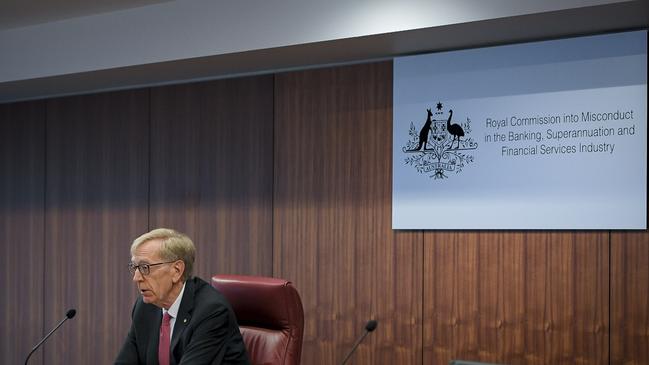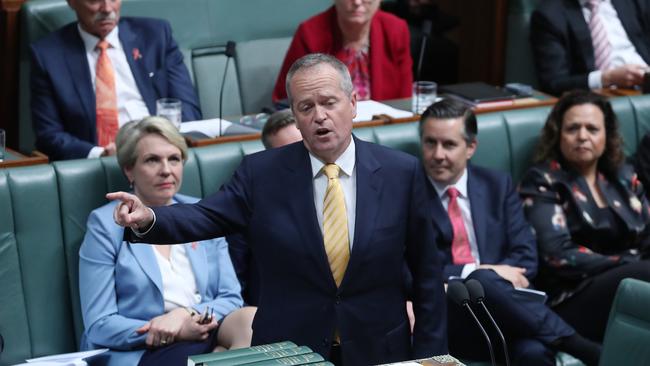The banking royal commission will bring higher charges and tougher lending access for us all
There will be “bad” consequences flowing from the banking royal commission that will affect what’s happening in the economy through 2019 and 2020, writes Terry McCrann.

Terry McCrann
Don't miss out on the headlines from Terry McCrann. Followed categories will be added to My News.
The “bad” consequences from the banking royal commission are more certain to happen than the “good” ones. They will also come more quickly.
Simply and broadly, the good ones fall into two categories.
The first is a better regulated financial system and regulators — especially the corporate cop ASIC — which actually work and work in something approaching real time, and with banks playing by the rules. The second, bluntly, is not to be ripped off by a bank or other financial institution.
Surely, that’s all been the entire point of having the RC. And it’s already worked to the extent of exposing the failings and wrongdoings of both regulators and the banks. And indeed getting both to admit their errors and promise “not do it again”.
TERRY MCCRANN: A DEAL IS A BETTER BET
TERRY MCCRANN: PREPARE FOR LABOR FEDERAL GOVERNMENT
Now, all that remains is for Commissioner Kenneth Hayne to produce his recommendations and for the government to implement them so that “it won’t happen again”.
Then we would move into a glorious future where no bank would do anyone wrong — and if they did, ASIC or APRA or someone would jump on them immediately and effectively.
If only it were that easy. Hayne is going to produce his final report by February. That will arrive smack in the middle of either a real or phony election campaign.
On one level that makes for a pretty good chance of what he recommends being accepted by both sides on a bipartisan basis. The government in particular is hardly going to take a “pro-bank” approach by rejecting them.

However, it also means it will tend to get lost in the usual dynamics, promises and attacks of an election campaign. In more practical terms, this time frame postpones any significant legislative or regulatory action into the back-end of 2019 at the earliest.
For those who see the banks as needing the very toughest and tightest regulation and more aggressive action by the regulators, the good news is that it will all almost certainly be overseen and delivered by a Shorten Labor government.
That is to say, by the side that wanted the RC as contrasted with the side — the Coalition government, despite the urgings of some of its members — that did not want it.
For all that I remain sceptical that we are going to come out the other side of this with quite what those who believe the banks are bastards expect.
There’s also a far more potent, far more real reality.
A Shorten Labor government will be delivering the reforms to make banks and regulators work better. It will also be delivering other policies that will negatively affect both banks and their customers.
It will also be delivering all this in an economic and financial climate that might well have turned colder.
All this is why the “bad” consequences that will flow from the royal commission — quite irrespective of the future policy and regulatory changes themselves are both more certain and will come quicker.
These fall into two categories. They are the revenues that banks lose, which they will at least partly seek to replace by charging customers more heavily or more directly for services; and cutting back on loans.
They will be losing revenues they should not have been getting in the first place. But they were also using those revenues to cross-subsidise other services. Now, they will charge for those services directly.

They have been accused of making loans to borrowers they shouldn’t have. They won’t only cut back on those loans but indeed on loans to borrowers more broadly.
It’ll become much harder to get a loan in the future and you will probably pay more for it or the associated costs.
This will collide directly with Labor’s three-pronged attack on investors — reducing negative gearing, increasing the capital gains tax and ending the refunding of excess franking creditors.
There’s a legitimate case for all of those moves — I personally would have done some of them differently.
But legitimate or not, they will be delivered — thanks to the near certainty of a Labor-Green Senate majority; and they will add to the dynamics of banking reform to make access to bank credit much harder and also more expensive.
A similar mix of forces is going to hit superannuation and financial advice. There’ll be (appropriately) more direct fees and other charges, at a time when the earnings dynamics will be both harder and less profitable.
Then all this will both play into and indeed affect what’s happening in the economy through 2019 and 2020.
It’s not an argument against doing it, just a statement of consequence and timing.
There’s a big thing that’s also been lost in all this. The vast majority of Australians have not been ripped off by their bank.
Self-evidently they then don’t pick up the benefit of not being ripped off. But they will still be paying the cost of the higher charges and tougher lending access.



